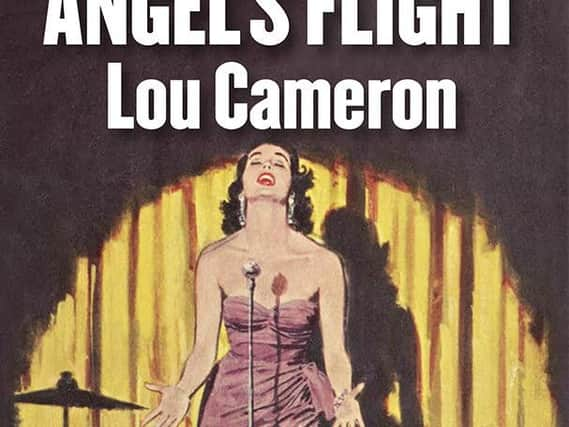Book review: Angel's Flight by Lou Cameron


Angel’s Flight, first published in 1960, is the long-forgotten debut by prolific American author Lou Cameron who died in 2010 having written more than 300 novels.
Although his extensive body of work consists of scores of movie and TV novelisations, comic books, spy thrillers, and war and crime novels, Cameron is best remembered as an accomplished author of Westerns. He won the WWA Spur Award for Best Western Novel and penned a number of popular Western series, including the long-running Longarm series which he wrote using the pseudonym Tabor Evans.
Advertisement
Hide AdAdvertisement
Hide AdAngel’s Flight, his first novel-length foray into crime writing – described by Gary Lovisi in his enlightening introduction as ‘an underrated and unacknowledged noir masterpiece’ set to ‘a jazz and a be-bop beat’ – showcases Cameron’s exceptional versatility and boldness as a writer.
Rich with jive-talking, colourful characters and vivid details about the sounds and trends of east and west coast America during the 40s and 50s, this engrossing, action-packed novel centres on the jazz music scene, from the days of swing and ‘birth pangs of bop’ to the ‘Afro-Cuban kick’ and the beginnings of the cool jazz era.
The hard-boiled narrator is musician-turned-producer Ben Parker, a tough, ‘honest’ and upright insider, ‘the lone wolf’ in a corrupt and ruthless industry. Reliably droll, Parker is a salt-of- the-earth type, able to maintain a brave face and wisecrack in the most hellish of circumstances. Unlike everyone around him, he doesn’t ask for payola and isn’t afraid to take on the mob or powerful, dangerous competitors in order to keep his company afloat.
His story begins in a club in downtown Los Angeles in 1939 when Parker is playing bass with the influential jazz combo Daddy Halloway and his Hot Babies. This is the moment when Parker first meets the loathsome young newcomer Johnny Angel who is the thread that ties together the epic tale. Observing his ‘cobra eyes’ and ‘phony smile,’ Parker takes an instant dislike to the ‘sharp and good looking’ youngster.
Advertisement
Hide AdAdvertisement
Hide AdHis instincts are sound. Angel turns out to be a cold, cruel opportunist who will stop at nothing to get what he wants, and it isn’t long before he takes over of the band and renames it Johnny Angel and his Devils, fires Parker, ruins Holloway’s daughter, and steals the opening tune of Holloway’s act, entitled Angel’s Flight.
Over the course of the next twenty years, the two men repeatedly cross paths as they traverse the music world.
Parker’s life is full of ups-and-downs. He serves in the Second World War, falls in love, experiences heartache and tragedy and the horrors of conflict, works in the ‘dirty record business’ performing to ‘blue lyrics,’ helps compose a Hollywood film score, and starts his own record label.
Meanwhile, the Machiavellian, ‘devil worshipping’ Johnny Angel lies, cheats and steals his way to the top, craftily avoiding serving in the war, profiting from the musicians’ strike, and claiming credit for other musicians’ work. He tramples whoever is in his way, even when it results in blood on his hands, and eventually winds up with ‘four headline bands and a penthouse on Central Park East.’
Advertisement
Hide AdAdvertisement
Hide AdThe one person he hasn’t ‘stomped all over’ is his former band member, Parker. But when Parker becomes a thorn in his side, he sets his sights on bringing down the man derisively described by his peers as the ‘Sir Galahad’ of the music business.
The scenes between the two men bristle with tension, and the explosive finale is in keeping with the rest of the surprising, twisting storyline.
Enthralling, memorable, and with a large ensemble of authentic, intriguing characters, Angel’s Flight comes across as a music lovers’ tribute to the changing landscape of jazz. Put simply, it’s a piano pounding, brass blaring, pitch-perfect extravaganza that will ‘knock you dead.’
(Stark House Press, paperback, £9.95)